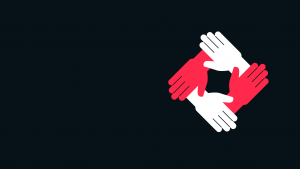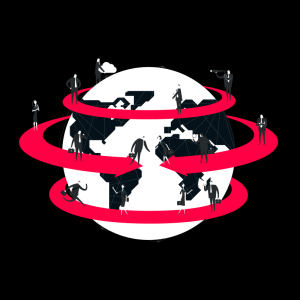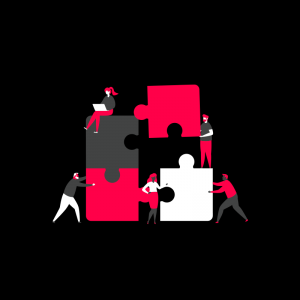
Nous sommes des Hybrid-Makers
Un monde plus complexe et plus surprenant implique un nouvel état d’esprit. L’hybridation est ce nouvel état d’esprit, qui consiste à développer la plasticité de notre
L'hybridization of skills is one of our strong points at iQo. Behind this expression (which may seem fashionable to some) lies the reality of our employees' hybrid skills and profiles. In the consulting business, openness and curiosity, as well as rigor, are sought-after soft skills. Today, at iQo, we're reinventing the world of consulting by turning our consultants into hybrid makers.
Faced with the complexity of an ever-changing world and the transformations experienced by companies, the hybridization of skills is increasingly becoming the new norm within companies, enabling them to adapt more effectively.
Focus on an emerging concept through the example of three typical professions:
The current standard of a single professional activity is a recent and already outdated idea! The human being is a jack-of-all-trades.
Between expertise and openness to new knowledge, many organizations today are looking to break down silos in favor of a pooling of intelligence (collective intelligence) guided by the triptych
A philosophy that also responds to the quest for meaning and fulfillment at work. "The current norm of a single professional activity is a recent idea that's already outdated! The human being is a jack-of-all-trades. It's a natural way of functioning that we've forgotten," emphasizes anthropologist Audrey Chapot, author of a book entitled Éloge des métiers hybrides (2021), to the FocusRH website.
A sign of the times, this openness is becoming increasingly integrated into the curricula of French business schools. In its strategic plan "Impact future generations 2025", EDHEC has made it a key focus: " In a society where the jobs of the future have yet to be imagined, the hybridization of knowledge and the desire to make an impact will be major assets in training well-rounded managers eager to solve major societal problems."
Added to this strong trend is the rise of the "maker" culture in the corporate world, born in fablabs and hackerspaces (third places conducive to collaborative projects most often focused on engineering, robotics or 3D printing). For the " hybrid makers " of tomorrow's world, it's more important than ever to get their hands dirty and implement concrete solutions and recommendations. Innovation managers, human resources managers and information systems managers: focus on three typical professions that illustrate the notion of thehybrid maker.
In recent years, the very notion of innovation has changed to become much more flexible and open, transforming the way this profession is practiced. Before, we were more involved in R&D issues, driven by technological and scientific advances," recalls Ariel OhayonDirector of Innovation at iQo. The R&D manager often thought he'd made a breakthrough of a kilometer in terms of innovation, but that was only perceived as an advance of a centimeter by the customer".
The relationship has been reversed, and innovation now starts with the customer or user: " The innovation director must empathize with the customer to understand his needs. In this way, he'll be able to come up with a one-centimeter innovation that will be perceived by the latter as a kilometer!"
But understanding the user requires a 360-degree or " holistic " view, and a necessary hybridization of skills. For Ariel Ohayon, this means " enriching knowledge and thinking to solve a problem. I need a combination of data, market understanding, technology and consumer psychology ".
Everything he does, he does with a view to execution.
In recent years, the very notion of innovation has changed to become much more flexible and open, transforming the way this profession is practiced. Before, we were more involved in R&D issues, driven by technological and scientific advances," recalls Ariel OhayonDirector of Innovation at iQo. The R&D manager often thought he'd made a breakthrough of a kilometer in terms of innovation, but that was only perceived as an advance of a centimeter by the customer".
The relationship has been reversed, and innovation now starts with the customer or user: " The innovation director must empathize with the customer to understand his needs. In this way, he'll be able to come up with a one-centimeter innovation that will be perceived by the latter as a kilometer!"
As IT skills become more widespread throughout the company, " the CIO no longer has the monopoly on technical expertise ", observes Bertrand Mingauda partner at iQo. Today, his role is above all to ensure that " the right choices are made at the right speed, to strike the right balance between innovation and sustainability ". Beyond innovation, he is also asked to "guarantee that what we're plugging in today will still work in ten years' time. With sustainability in mind, for today's CIO, investing massively in the metaverse is an ill-considered risk. At the same time, however, they need to experiment, so as to be ready to react very quickly..."
At the same time, the growing complexity of IT innovation challenges means that we need tohybridize our skills by " integrating new dimensions ", whether in web development (DevOps, i.e. merging code development and operations carried out by system administrators), cybersecurity issues to be integrated into operations from the outset (DevSecOps), or contractual and economic issues (FinOps).
At the same time, the growing complexity of IT innovation challenges means that we need to hybridize our skills.
"Hybridization reinforces the key governance role of the CIO ," notes Bertrand Mingaud, adding that the CIO's role is more to steer the makers than to be a maker himself.
Increasingly, the job also includes a design dimension, with particular attention paid to man-machine interfaces (dashboards or interfaces enabling communication with a machine). The aim is to create " a product designed for its user" , making it as intuitive and ergonomic as possible. An approach that does not ignore the "Positive Impact" philosophy. Positive Impact "This involves both implementing techniques to reduce environmental impact (GreenIT) and ensuring the ethical use of user data.
The health crisis marked a turning point for human resources. For Claire Thouveninfounder of Go Blossom (an HR outsourcing company), their role was transformed during this period, when HR departments began to launch initiatives that were either unprecedented or not yet widespread, from e-learning to remote team management.
More than ever imbued with the maker culture through the implementation of concrete initiatives of this type, HR departments are also increasingly data-driven. Whether it's a question of recruitment aided by artificial intelligence algorithms to identify compatible profiles, forward-looking employment and skills management tools, monitoring absenteeism rates or payroll, data-related skills are becoming essential in this profession.
A unit of the Colonna brokerage group, xCo Analytics offers a data science service to " identify in ever finer detail [the] untapped performance levers " of companies, touching on absenteeism and employee commitment, as well as the transformation of the working environment.
In fact, QWL (Quality of Working Life) issues are becoming an increasingly important part of the HR function, which can now rely on dedicated start-ups. One of these is Supermood, a platform offering regular, fun micro-surveys to gauge employee fulfillment and commitment at work, enabling HR to take informed action.
Last but not least, it's up to HR departments to take into account the hybridization of skills on the job market. This is already the case today, with soft skills increasingly being taken into account, while 62% of recruiters are prepared to recruit a candidate primarily on the basis of his or her behavioral skills (according to a survey conducted by Cadremploi and Michael Page in 2019). For Claire Thouvenin, it's up to human resources to adapt to this new situation by " opening up the field of possibilities" .
62% of recruiters are prepared to recruit a candidate primarily on the basis of behavioral skills
In the future, these three professions could even become intertwined. " Never before has a human resources director had so much to do to integrate information systems and innovative digital tools into his or her approach to the job, as if human resources management, information systems management, innovation management and digital management were gradually intertwining and hybridizing, forcing each to undergo a veritable metamorphosis ", says Gabrielle Halpern, author of Tous centaures! Éloge de l'hybridation (ed. Le Pommier, 2020), in an interview with Editions Législatives. So the " hybrid maker " revolution is only just beginning?

Un monde plus complexe et plus surprenant implique un nouvel état d’esprit. L’hybridation est ce nouvel état d’esprit, qui consiste à développer la plasticité de notre

Over the past 2 years, there has been increasing talk of hybrid working in companies. We've published a number of articles on the subject: Futur

Too few managers really consider the subject of corporate culture. Quite often, it is taken for granted, with some not hesitating to
